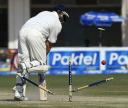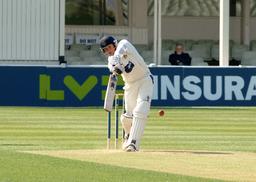Planning an Innings
Firstly, let me say there are many ways of planning an innings! This is just one. You have to adopt a planning process that works for you – that is, one that is successful and you can easily replicate every week. It should be a way of approaching each innings and one that you feel comfortable implementing.
Aussie view: How to get run out
Brisbane cricketer, Simon Eggins is back with his view on club cricket from the other side of the world. This time it's all about run outs.
Running between the wickets is undoubtedly a key aspect of the game, yet for most club players it is something that is virtually never practiced. This being true, it's surprisingly easy for even the best of us to forget the basics and to gift the opposition a run out, especially at moments of high pressure. Though not an exhaustive list, here are a few basic errors that can be easily avoided.
How do you prepare on match days?
 Do you warm up with a pint and a plate of chips or do you have a highly developed ritual on match days?
Do you warm up with a pint and a plate of chips or do you have a highly developed ritual on match days?
Research and experience on pre-game preparation is unclear. What works for one player is pointless for another in many cases, although there are some constants we can all benefit from.
Rituals
My own, slightly obsessive, preparation starts early and keeps going right the way through the match. I'm big on routine and feel more relaxed when I know exactly what I‘m doing.
Aussie View: A Third Man – Are You Crazy?
I'm delighted to welcome a brand new contributor: Brisbane cricketer, Simon Eggins. Simon will be providing a regular view on the club game from Down Under. Inspired by a discussion he had with his captain, Simon tells us about the merit of using a third man in the early stages of a game.
 Picture this situation in a typical unlimited overs game. Your team is bowling on the morning of the first day having lost the toss, and after 15 or so overs when you come off for the first drinks break you check the scorebook to find that the opposition is 1/40 (or 40/1 if you're not in Australia) – a disappointing result given your side's total dominance so far. Your opening bowlers have done brilliantly, getting the ball consistently in good areas and moving it away from the right handers, there's been play and miss after play and miss and balls falling just short of the slips, with only a lone edge going to hand. With the exception of one majestic off drive, very little has been hit successfully off the square.
Picture this situation in a typical unlimited overs game. Your team is bowling on the morning of the first day having lost the toss, and after 15 or so overs when you come off for the first drinks break you check the scorebook to find that the opposition is 1/40 (or 40/1 if you're not in Australia) – a disappointing result given your side's total dominance so far. Your opening bowlers have done brilliantly, getting the ball consistently in good areas and moving it away from the right handers, there's been play and miss after play and miss and balls falling just short of the slips, with only a lone edge going to hand. With the exception of one majestic off drive, very little has been hit successfully off the square.
Do you make these mistakes as captain?
Who was the best captain you ever played under? Hopefully you learned a lot from them. If you didn't you might still be making these mistakes:
- Ignoring advice. Advice is a funny thing. There is always plenty around when the team is doing well, but when you are getting soundly thrashed the captain is on his own. Despite this a good captain always takes on as much advice as he can (even if he has to seek it out). Everyone has an opinion and often it's different from your own so consider everything.
How standing up to seamers will win you more games
Have you noticed how much more top wicketkeepers are standing up to seamers recently? It's a useful skill because it will get you more dismissals than standing back. This is especially true at club level where the pace of bowling is slower and the wickets are not as quick. You just need to be sure it is being done right.
When to stand up and when to stand back
Standing up is generally the best option at club level.
Now your club side can have an extra 50 runs per innings
How many more games a year would your team win if you could be sure of an extra 50 runs per innings?
In the traditional 50 over format you see in most English leagues that would only be an extra run per over. Follow this guide and can be achieved with the minimum of fuss or risk. If you are alert to the opportunities.
Is it possible to plot a batting collapse?

"Bowling sides should have a set of pre-determined plans about how to initiate and maintain an incipient batting collapse: Which bowlers will be used in what order, what will be their role, what field settings are most helpful, optimum rate of overs, and the psychology of inducing 'mental disintegration' among the incoming batters.
Score More Runs By Playing the Gaps
 First class players are coached early on to be aware of the field and place their shots into gaps to increase their run scoring chances. At lower levels, this is emphasized less, but you can use the tactic to score more runs.
First class players are coached early on to be aware of the field and place their shots into gaps to increase their run scoring chances. At lower levels, this is emphasized less, but you can use the tactic to score more runs.
The rise of chirping, or Should wicketkeepers shut up?
Poor old Matt Prior. The first English wicketkeeper who dares to use a bit of lip to put off the batsman gets told by an Aussie to shut up.
Ignoring that irony, one thing that is for sure is that the noise of keepers at all levels has dramatically risen under the the banner of chirping. The theory is twofold. First you put off the batsman by making him lose his concentration or feel under pressure. Second you keep the fielding side on their toes through constant encouragement.

